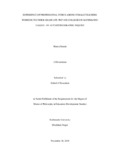
Please use this identifier to cite or link to this item:
https://hdl.handle.net/20.500.14301/344| Title: | EXPERIENCE OF PROFESSIONAL ETHICS AMONG FEMALE TEACHERS WORKING IN UNDER-GRADUATE PRIVATE COLLEGES IN KATHMANDU VALLEY: AN AUTO/ETHNOGRAPHIC INQUIRY |
| Authors: | Sitaula, Mamta |
| Citation: | Sitaula,M.(2018).Experience of Professional Ethics among Female Teachers Working in Under-Graduate Private Colleges in Kathmandu Valley: An Auto/Ethnographic Inquiry. |
| Issue Date: | Nov-2018 |
| Publisher: | Kathmandu University School of Education |
| School: | SOED |
| Department: | DODE |
| Level: | M.Phil. |
| Program: | MPhil in Development Studies |
| Abstract: | Many of the female teachers teaching in the undergraduate colleges face lots of unethical behaviours during the tenure of their professional lives. This propensity of being troubled leads to a kind of frustration. Some of them somehow manage to overcome it and stay in the profession while some of them tend to quit the profession. A feeling of discomfort crops though they admire their profession. This feeling of clashing their professional ethical concerns with institutional misconducts is wisely explained as ‘experience of professional ethical considerations’ in my dissertation work. In professional ethics, everyone is expected to perform their duty fairly. However, this concern is not appreciated on many occasions. On top of that, the administrators also do not demonstrate equal treatment in several contexts. This concern is also equally important for female teachers in teaching profession in Nepal. There is a gap between what the female teachers are entitled to do and what they want to do in their attempt to be proficient in their professional practices. The gap creates controversies amongst the understanding of female teachers about their professional ethical performs. Henceforth, they cannot develop good feelings and give as equal devotion towards their work as males. The consequences are that female teachers perceive domination, and suppression from the side of the management. However, they cannot speak against the existing practices. Considering this, a study was carried out to explore the female teachers' experience of professional un/ethical practices. The study adopted qualitative research design with humanist research paradigm. Similarly, for in-depth inquiry, I adopted auto/ethnography to study the phenomenon where I myself was a participant to relate the feelings of myself with the other participants. The everyday experience was explored in a natural setting, living and participating with the other teachers in their social and cultural world. For the process of data collection/generation, informal in depth interview, and observation method was used. Data saturation was maintained by interviewing five female teachers from four undergraduate private colleges of Kathmandu Valley. Field memo and diaries were the means of data collection. The research incorporated the reviews of literatures and theories that justify the professional ethics of female teachers. The findings were compared and contrasted with the literature of paradigm of care, justice, critique, silence and profession. I also used feminist, conflict, critical and, turbulence theory with multiple ethical paradigm, and classical ethical theories to examine the constructs of professional conducts. Ethical measures and credibility were highly considered during each phase of study. The findings of the study showed that there exists gender discrimination among the males and female teachers in pay systems, leaves and other facilities. The study showed that the female teachers were facing harassments, nepotism, favouritism, and even bullying environment from students. The findings further revealed the ethical perception of female teachers was clashing with institutional rules and principles. There was even lack of facilities for the female teachers and the female students. Thus it was inferred that there was unsafe environment for female teachers. The findings additionally exposed that female teachers were seen helpless to teach using their skills and new pedagogical techniques. As a result, female teachers did not feel comfortable in several instances. However, the females did not consider it in a problematic ailment as they were culturally grown in a similar setting of male dominated society. Therefore, for gender friendly environment in colleges, there is a dire need of consciousness within female teachers. The management and the stakeholders need to amend their plans, schedules, and codes of conduct to accommodate the insights of the female teachers. Policies can be revised. Similarly, strict implementation of acts can be made from the side of all the concerned parties for maintaining a favourable professional ethical consideration in the favour of female teachers in Nepali milieu. Key Words: ethics, professional ethics, female teachers, perception, gender equality. |
| URI: | https://hdl.handle.net/20.500.14301/344 |
| Appears in Collections: | Dissertations |
Files in This Item:
| File | Description | Size | Format | |
|---|---|---|---|---|
| Mamta_Mphil_Final 2018_2nd Oct_APA (1) (2).pdf | 1.68 MB | Adobe PDF |  View/Open |
Items in DSpace are protected by copyright, with all rights reserved, unless otherwise indicated.